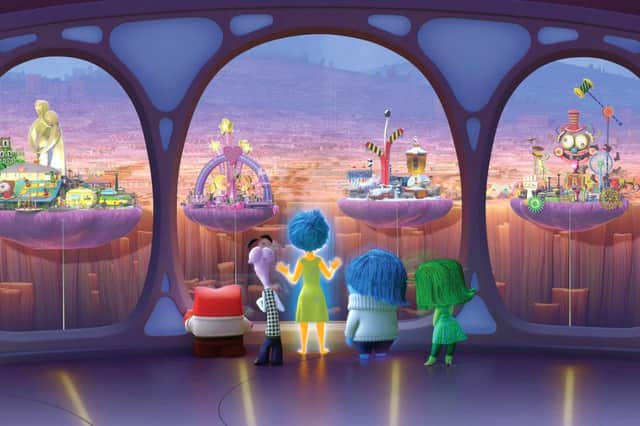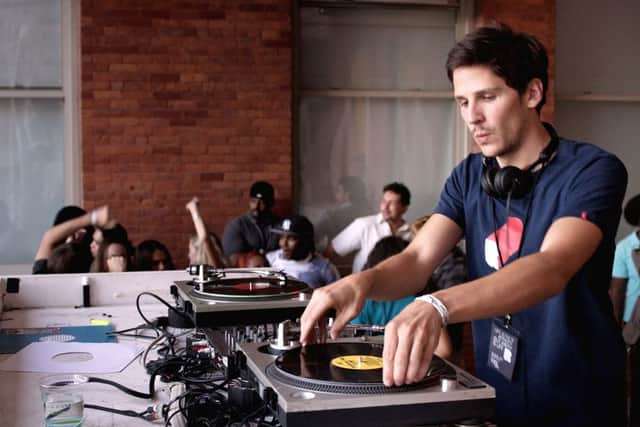Film reviews: Inside Out | Eden


Inside Out (U)
Directed by: Pete Docter, Ronaldo Del Carmen
Voices: Amy Poehler, Phyllis Smith, Bill Hader, Lewis Black, Mindy Kaling, Kaitlyn Dias


Rating: *****
Just when it seemed as if Pixar was becoming too reliant on churning out sequels to its first wave of impeccably crafted hits (we’ll discount the bafflingly successful Cars from consideration here), along comes Inside Out to remind us of the jaw-dropping conceptual flights of fancy the animation studio is capable of pulling off.
Advertisement
Hide AdSet mostly inside the head of an 11-year-old girl called Riley whose personified feelings govern her everyday actions, the film shows how Anger (Lewis Black), Fear (Bill Hader), Disgust (Mindy Kaling) and Sadness (Phyllis Smith) start to dominate Riley’s life when she moves with her family from Minnesota to San Francisco. The trauma of this move – she misses her friends, her room, the freezing weather that allowed her to go skating on the lake – has created an emotional crisis in Riley (Kaitlyn Dias) that she doesn’t know how to express to her loving but harassed parents (she’s also starting to pick up on their anxieties about money and jobs). This leaves the formerly dominant Joy (voiced by Amy Poehler) with a battle on her hands to regain control of this once-happy little girl’s mind which, in the film’s most audacious and brilliantly imagined conceit, is shown to be an elaborate theme-park-like land consisting of interlinked islands representing the different formative aspects of her personality, all precariously held together by her brain and the memories she’s forming on an ongoing basis.
That’s a pretty abstract concept for any film, but it’s a testament to Pixar that in the 20 years since Toy Story’s release, the studio has made it their mission to raise the storytelling bar above even the technological one. For all the dazzling visual wonders present in Pixar’s back-catalogue, the progression from talking toys to talking emotions is more impressive and certainly wouldn’t have been possible without first making us experience the existential loneliness of a waste-management robot in Wall-E, or feel in the first five minutes of Up the very real heartache of a long and loving marriage haunted by an inability to have children.
Inside Out surpasses even those efforts, though. It is Pixar’s most emotionally complex film yet, not least because it understands how children think and isn’t scared of commenting on the potentially debilitating effect shielding kids from unhappiness may have on their own development. Joy, for instance, is forever trying to keep Sadness at bay in Riley’s head because she’s worried that her melancholic disposition will infect the “core memories” – rendered here as portable crystal ball-like spheres – that give Riley a sense of her self.
But Joy’s own insecurities about Sadness exacerbate rather than prevent the problem she’s trying to solve, her altruistic determination to suppress her colleague proving as futile as the efforts of Riley’s parents to get their little girl to cheer up by forcing a smile.
The correlation between the characters’ interior and exterior lives is beautifully handled here, with directors Pete Docter (Up) and Ronaldo Del Carmen working hard to provide entertaining links between the complicated thought processes going on behind each facial expression.
This is also the source of some of the film’s funniest moments, particularly when we briefly enter the heads of Riley’s mum and dad (voiced by Diane Lane and Kyle MacLachlan) or, in a hilarious and, alas, all-too-accurate gag late on, the head of a teenage boy.
Advertisement
Hide AdThe rest of the film is a veritable treasure trove of jokes, sly philosophical observations and ingeniously rendered set-pieces, the delights of which should be left for individual viewers to unpack without spoilers.
For all the implicit mind-bending wonder in its central premise, though, the film remains accessible and easy to understand without ever feeling watered down – yet another sign of Pixar’s storytelling prowess.
Advertisement
Hide AdBut that’s also a sign of how well the studio casts its movies. Most of Inside Out’s vocal talent has been sourced from American television comedy, which gives the characters the feel of old friends whether you’re familiar with the shows or not.
Poehler in particular lives up to her character’s name, riffing on the adorable officiousness of her Parks and Recreation creation, Leslie Knope, to play Joy as a tireless bundle of positive energy whose management of Riley’s brain is driven by an unflappable commitment to securing her overall happiness and wellbeing. As Sadness, Phyllis Smith (the American version of The Office) offsets this with a wonderful Eeyore-like quality.
Far from being a vortex of negativity, though, Sadness’s lack of discernible purpose in Riley’s life – neither she nor Joy quite know what role she’s supposed to play in it – only makes her melancholic nature more winsome. We feel for her because deep down we know it’s okay to feel sad.
Without sadness, after all, joy loses its meaning – a message this film embraces with heartbreaking delight.
THIS WEEK’S FILM RELEASES
Eden (15)
Directed by: Mia Hansen-Løve
Starring: Félix de Givry, Pauline Etienne, Greta Gerwig, Brady Corbet
Rating: ****
There’s a great moment in Mia Hansen-Løve’s sprawling, epic, blissfully transcendent film about the rise of the French house scene that defines the type of music film we’re going to get. It occurs early on and features a pair of young DJs nervously workshopping a new track at a party for their friends. Anyone vaguely familiar with dance music over the last 20 years will immediately recognise the electro futurism of Da Funk, the break-out single by Daft Punk, as it blasts out of the speakers in its nascent form. The scene itself is redolent of those cliché-ridden crucible moments of creativity music biopics love to mythologise, but Hansen-Løve eschews this kind of cinematic cheese, pulling away from the future superstar DJs (played by Vincent Lacoste and Arnaud Azoulay) in order to return us to the film’s actual protagonist: a fellow aspiring DJ, Paul (Félix de Givry), whose career will never come close to equaling his contemporaries’ eventual domination of the music scene.
Advertisement
Hide AdThat Daft Punk become periphery players in the ensuing film – forever being denied entry into clubs by doormen who don’t recognise their faces – is part of the film’s formal brilliance: Eden isn’t a film about people conquering an artform and breaking through into the mainstream; it’s a film about getting thoroughly lost in a musical revolution as it orbits around you, occasionally overlapping with your own ambitions, but mostly not. As such, it won’t necessarily satisfy those looking for a bullet-point history of a scene that birthed one of the biggest and most influential acts of the last two decades. It does, however, offer an intriguing insider’s view of an important musical subculture, an insider’s view that, crucially, remains rooted in the all-too-relatable reality from which the music itself is designed to offer temporary escape.
Co-written by Hansen-Løve and her brother Sven (upon whose own experiences Eden is based), the film follows Paul from the early 1990s to the early 2010s as the club culture he and his friends are an integral part of takes off and changes in ways that are fun, but also unsustainable.
Advertisement
Hide AdIndeed, amidst all the hedonistic reverie, Paul’s promising academic career falls by the wayside, his drug use gets out of hand, he becomes mired in debt and has his heart broken on more than one occasion. Far from this being a mundane cautionary tale, however, Hansen-Løve finds noble beauty in it all, seamlessly structuring the drama in a naturalistic way so the repetitive beats of the soundtrack echo the repetitive beats of her protagonist’s existence, subtly underscoring how music should be a reflection of a life, not a replacement for one.
Best of Enemies (15)
Directed by: Robert Gordon, Morgan Neville
Rating: ****
The dire nature of the partisan political punditry that has infected all aspects of the media began not with the creation of Fox News or talk radio, but with the on-air spats between two of America’s most erudite and distinguished men of letters. That, at least, is the thesis of Robert Gordon and Morgan Neville’s thoroughly entertaining documentary about the war of words that erupted between William F Buckley and Gore Vidal during a series of televised debates about the already incendiary 1968 American presidential election campaign.
With US society being ripped apart by civil unrest, the struggling ABC network opted to reflect the country’s ideological divisions by pitting Buckley, the editor of the National Review and the architect of modern American Conservatism, against Vidal, the openly gay blueblood bastion of the Left whose essays and novels (particularly his licentious satirical hit Myra Beckinridge) so offended the opposition. The verbal dexterity of both men is breathtaking to behold as archival footage shows them deploying elaborate syntactical jujitsu to counter and undermine one another’s arguments.
The irony, however, is that a brief, headline-grabbing devolution into name-calling unintentionally provided the blueprint for the kind of antagonistic, soundbite-driven political theatre that has constituted political commentary ever since.
Maggie (15)
Directed by: Henry Hobson
Starring: Arnold Schwarzenegger, Abigail Breslin, Joely Richardson
Rating: ***
The Terminator aside, Arnold Schwarzenegger’s ability to craft a credible performance has never been a prerequisite of his movies, but in zombie family drama Maggie he is at least making an effort to expand his emotional range. That’s not quite the same as saying he successfully disappears into the role of a father caring for his eponymous on-the-turn daughter (Abigail Breslin). It is, however, quite touching watching him attempt lines with the depth of feeling we take for granted in other actors.
Advertisement
Hide AdThe film itself is like an Emo spin on The Walking Dead: a never-fully-explained zombie apocalypse has devastated the country, but the twist is that the six-to-eight week incubation before infection takes hold means the emotional fallout involved in confronting the inevitable is unusually prolonged. Essentially it’s using zombies as a metaphor for terminal illness, which makes it a more dolorous film than one might have expected, but with the current pop culture ubiquity of zombies, it also shows there’s life left in the undead yet.
The Legend of Barney Thomson (15)
Directed by: Robert Carlyle
Starring: Robert Carlyle, Emma Thompson, Ray Winstone, Ashley Jensen
Rating: **
Advertisement
Hide AdRobert Carlyle, left, directs and stars in this scattershot black comedy about a socially inept Glaswegian barber (Carlyle) who accidentally kills his boss and becomes the prime suspect in the hunt for a local serial killer. Sort of a comedy of errors without much actual comedy, the film is most notable for casting Emma Thompson as Barney’s mother. Subsumed by crone make-up and fag smoke to disguise the fact that she’s only two years Carlyle’s senior, Thompson does provide some novelty value, but this soon wears off as the film becomes overly reliant on groaning Glaswegian banter, period anachronisms, Filth-style shock-Jock humour and pantomime grotesquerie.
Carlyle has worked with enough great directors to know how to frame his home city in stylish and unconventional ways, but in terms of the plot, tone and performances, whatever he’s going for doesn’t translate into the macabre laughs its jokily violent premise demands.